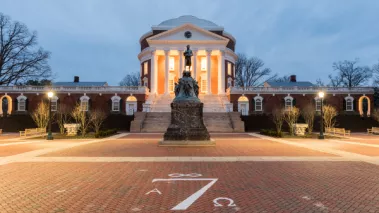Table of Contents
Virginia attorney general issues new demand for University of Virginia documents

(Felix Lipov/Shutterstock.com)
On September 29, Virginia's Attorney General, Kenneth T. Cuccinelli, II, issued a new Civil Investigative Demand (CID) for a huge amount of documents relating to his investigation of former University of Virginia professor Michael Mann. Mann is one of the people at the center of the well-known "Climategate" controversy.
Cuccinelli's previous CIDs were set aside by Judge Paul M. Peatross, Jr., who ruled that four out of the original five grants that were being investigated were not state grants and therefore out of the scope of the Virginia Fraud Against Taxpayers Act (FATA). Cuccinelli had issued the CIDs as part of a fraud investigation under FATA. The fifth grant, Judge Peatross ruled, could only be subject to investigation under FATA "if any funds were paid on the grant after January 1, 2003," the date FATA went into effect. (Documents from an earlier time could be requested "as reasonable discovery to evaluate any conduct after January 1, 2003.")
As for the scope of any possible future CID on the 2001 state grant, Judge Peatross stated that the information available for review would be limited significantly:
[T]his request would be limited to correspondence ... to or from Dr. Mann that relate to any information, materials or documents contained in the application for the 2001 U.Va internal grant and any information, materials, or documents provided by or to Dr. Mann that relate[] to approval or payment of any funds to him at any time under the grant until it ended.
As I wrote on August 30, Peatross set a reasonably high bar for demonstrating an objective reason to believe that a public university in Virginia holds documents relating to an investigation of a professor for fraud under FATA, and stated that the documents that must be produced should be limited to the topics of "the application for the ... grant" and "approval or payment of any funds ... under the grant."
So, Cuccinelli's new CID is limited to one grant on which Mann was a co-investigator, a grant that was based on money from a University of Virginia fund. The new CID also specifically states "[t]he nature of the conduct" being investigated:
[H]e participated in the application for and claims for payment under the grant .... Upon information and belief, the grant application references Dr. Mann's prior work, including two papers ... which have come under significant criticism (see Attachment B, which is incorporated herein by reference) and which Dr. Mann knew or should have known contained false information, unsubstantiated claims and/or were otherwise misleading. Specifically, but without limitation, some of the conclusions of the papers demonstrate a complete lack of rigor regarding the statistical analysis of the alleged data, meaning that the result reported lacked statistical significance without a specific statement to that effect. To the extent that Dr. Mann did reference or rely on his past work in these papers (or others like them) to aid in the winning of the grant when he knew of [or] should have known of the potential of the papers (or others like them) to mislead the grantor, such actions would subject him to potential FATA liability. ... Further, if the work on the grant built on any prior work that suffered from the same or a similar flaw, Dr. Mann would also be subject to liability. This would apply to any claims for payment or payments made under the grant ... after January 1, 2003. [Citation omitted.]
We'll see if this information, including a dozen pages of explanation in Attachment B, proves persuasive enough as a "reason to believe" that the investigation should go forward and that the University of Virginia should be required to release the requested documents.
Although the CID states that "[t]he investigation specifically relates to data and other materials that Dr. Mann presented in seeking the award of or claims for payment" under the grant, once again the CID asks for a huge amount of documents in addition to documents directly regarding the grant. The time period of the document request is January 1, 1999, through December 31, 2006. It includes 14 "Departments, Schools, [and] Programs" of the university, plus anyone "who assisted Dr. Mann regarding any of the Grants as defined in the CIDs" [sic]. It specifically includes all communication between Mann and 39 people, plus "[a]ll research assistants, secretaries or administrative staff with whom Dr. Mann worked" while he was at the university, plus any correspondence from or to Mann that references any of those people (including research assistants, etc.).
Well, intentionally misleading someone into giving you a grant is probably not going to count as an activity protected by academic freedom. Failing to engage in sufficient academic rigor, however, does not seem to be the kind of failing that would fit a fraud investigation. How many faculty members' grant proposals would fail such a standard? Let's see how the university and, I suspect, a judge, work out these issues. FIRE will keep you posted.
Recent Articles
FIRE’s award-winning Newsdesk covers the free speech news you need to stay informed.

FIRE to SCOTUS: TikTok ban violates Americans' First Amendment rights

California and other states are rushing to regulate AI. This is what they’re missing

One day after FIRE lawsuit, Congress passes changes to filming permits in national parks
